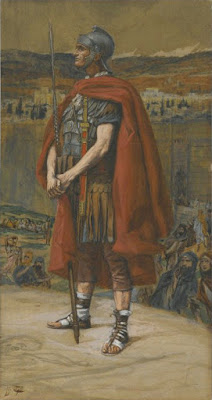HEALING THE CENTURION'S SERVANT (At Capernaum.)
MATT. 8:1, 5-13;
LUKE 7:1-10.
"And I say unto you, that many shall come from the east and the west, and shall sit down with Abraham, and Isaac, and Jacob, in the kingdom of heaven." Matthew 8:11
"Jesus here predicts the conversion of the Gentiles, since that fact is suggested to him by the faith of this centurion. The east and the west represent the extreme points of the compass in the directions in which the world was most thickly inhabited. But Jesus refers rather to spiritual separation than to geographical distances--Mal. 1:11; Isa. 49:19; Jer. 16:19; Zech. 8:22."--Fourfold Gospel
Jon Courson's take on the theological implications:
 |
| James Tissot, The Centurion |
"Let us be big people, realizing the kingdom is more expansive and inclusive than what our flavor might be philosophically, or what our theology might be dogmatically. May God give us eyes to see what He's doing in churches other than ours, in fellowships flavored far differently than ours. Be embracive. Be a lover of people. See what the Lord is doing." -Jon Courson
"And they, when they came to Jesus, besought him earnestly, saying, He is worthy that thou shouldest do this for him; for he loveth our nation, and himself built us our synagogue." Luke 7:4-5
"The centurion evidently believed in and worshiped God, but, influenced probably by his profession, did not become a proselyte by being circumcised and conforming entirely to the Mosaic law. He was what later Jews would have termed a Proselyte at the Gate, and not a full-fledged Proselyte of Righteousness. The ruins of Capernaum show the ruins of a synagogue. It was a beautiful structure, built of white limestone, shows by its architectural features that it was built in the time of the Herods, and there is little doubt that it is the one which this pious Gentile erected, and in which Jesus taught and healed." -Fourfold Gospel
Courson has this to say about the centurion's character:
"His care for his servant and his commitment to the Jews marked this Gentile centurion as a unique individual. No wonder he was highly esteemed by the Jewish elders, who said to Jesus, "He is worthy of Your help."
"The centurion, well knowing that it was unlawful for Jews to go into the houses of the Gentiles, lest they should sully the sanctity which they desired to maintain, wished to spare Jesus any embarrassment. Whatever he may have thought of this custom with regard to the Pharisees, he attributed to Jesus so high a degree of sanctity that he accepted the doctrine as true in reference to him. The centurion showed his great faith partly by believing that Jesus could heal by a word, but chiefly in his lofty conception of Jesus as compared with himself. The less faith we have, the less we esteem Jesus, and the more faith we have, the less we esteem ourselves. As Jesus rises, we sink in the scale of our estimation. The centurion's faith would have been wonderful enough in an Israelite, but it was all the more wonderful when found in the bosom of a Gentile. The word "found" suggests that Jesus came seeking faith: he will come seeking it again (Luke 18:8). The elders, little knowing the wideness of our Lord's vision and sympathy, supposed that Jesus would look upon the splendid synagogue erected for the Jewish people as a sufficient motive for granting their request. Even the apostles were slow to learn that at heart Jesus knew neither Jew nor Gentile." -Fourfold Gospel
"When Jesus heard these things, he marvelled at him, and turned him about, and said unto the people that followed him, I say unto you, I have not found so great faith, no, not in Israel." Luke 7:9
To some it seems strange that Jesus could marvel, but he had all the actual feelings of a man. However, we should note that 91 Jesus is never said to have marveled but twice. In this case it was because of belief, and in the other (Mark 6:6), it was because of unbelief. -Fourfold Gospel
"The Jews had their theology refined, but it was the Gentiles who had faith who caused Jesus to marvel." -Courson


No comments:
Post a Comment